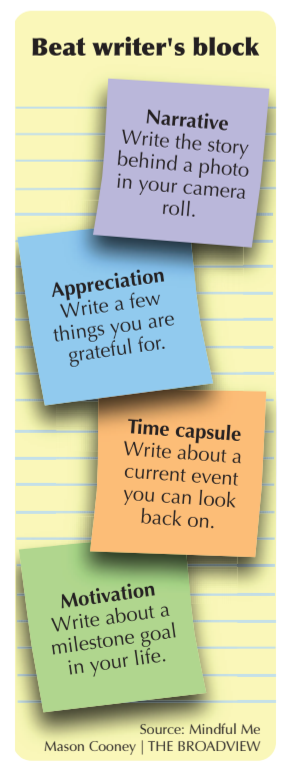Note to self
Daily journaling can offer stress relief, affirmation.
May 24, 2018
Images of “Bridget Jones” or “The Princess Diaries” may come to mind when thinking of journaling, but regular “Dear Diary” entries can provide more mental and physical health benefits than the movies give them credit.
“When you start writing, you come to these realizations and epiphanies,” junior Samantha Stovell, who has journaled in her pink notebook since Freshman Year, said. “You just get into this trance, let your mind flow and with no effort — you’re just going.”
Stovell, who journals about events in her life, hopes for her future, poetry and songs, says writing helps declutter her mind and inspire projects. She began journaling to de-stress and says she now writes every night before bed.
Unlike Stovell, sophomore Arlena Jackson journals whenever she is stressed or thinking about something in particular. Sometimes she starts with a simple summary of her day.
“I think when you make yourself do it everyday, you’re inclined to do it less because you’re not inspired,” Jackson, who is on her eighth notebook, said. “I’ve spent months where I do absolutely none of it and I’ve had months where I do around 10 pages a day. It just depends on how I’m feeling.”
Marriage and Family Therapist Stefan Benton says journaling can be an effective way of helping clients with anger, anxiety, trauma and depression. He recommends all his clients write three things they are grateful for every day, which is especially helpful for clients with depression.
“What that does is train our brain in that moment, like ‘Oh this is one of those things I can write about tonight in my gratitude journal,’” Benton, who journals almost every day, said. “When we have a gratitude thought, that lights up a different part of our brain than when we have a depressed thought.”
Gratitude journaling can also improve young adults’ determination, attention, enthusiasm and energy as well exercise patterns and physical ailments, according to a study conducted at the University of California Davis.
Journaling can also be helpful for clients with anxiety, according to Benton.
“It slows the brain down — we can’t write that fast,” Benton said. “When that happens, I’m able to come out of my anxiety and look at my thoughts. If you’re just thinking them, you can get really caught up in the overwhelm.”
Benton says journaling can help writers make a change in their lives by allowing them to look back over their thoughts and identify themes. Stovell says she often enjoys re-reading her entries and recommends everybody try journaling.
“You have an authentic account of your life,” Stovell said. “I don’t know if it’s for everybody, but I would at least try it for a week. At first it can be kind of annoying, but once it becomes a habit, it’s really cool.”










